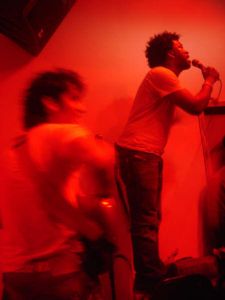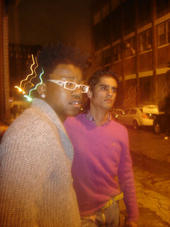|
“Seize the Day” not only serves as a partial definition of the name of the duo of Jahmal Tonge and Neil White but also sufficiently describes their philosophy in creating their music and how they present it to the masses. The Toronto (by way of Scarborough ) duo are free spirits, making the game work for them instead of waiting for people to take notice. From merging their diverse musical tastes to the creation of a unique sound to their assertiveness in networking and touring, there is no script and no one to assist them in making the jump to the elusive major-label deal. They are simply not interested, at least not yet. The Carps is a musical project that initially served as a vehicle for Tonge (vocals, drums) and White (bass) to indulge in a lifelong passion as music fans and as an escape from their university studies. Not getting into it to make loads of money, or for that matter, to pander to the lure of celebrity status, the friends only had one goal: To make music and to have fun while doing it. But was Toronto ready for them? After making the rounds in the Toronto club scene to a lukewarm response, they decided to call on friends in Philadelphia and New York City and explore the scene stateside. |
 Toronto Duo The Carps. |
To their surprise, the response was overwhelming. “We have incredible musicians (in Toronto ) and incredible bands, but people here are like, ‘well, whatever. I don’t have to really care about this new band, ‘cause we have so much good music.’ Maybe that’s it,” Tonge says. “ Toronto fans have become smug because of the inundation of Canadian acts that are successful in Canada and Stateside, which is the barometer of what Canadians define as success. New York gives new music and bands more of a chance.”
While many people of colour are involved in alternative forms of music, are Canadians still not ready for an African-Canadian vocalist and Sri Lankan / English bassist playing a fusion of Hip-Hop, Pop, Soul, and Punk?
“I grew up on psychedelic Rock,” White explains. “Jahmal, he had a Soul, Hip-Hop upbringing. We have been friends for so long that we have influenced each other’s tastes in music. A lot of people might come into listening to certain types of music by themselves, but this is music that we didn’t necessarily hear growing up in our homes, but through each other.”
This influenced the originality of their sound, Infusing their passions into a unique style that cannot be easily categorized but is influential in its presence in the Indie music scene. But how does the audience react when they see two men of colour on stage, not performing Hip-Hop?
They are used to seeing the Urban Outfitters crowd playing in Indie groups, but there has not been much comment on the diversity of the band. In New York they celebrate their diversity, glad to see it, here, there is no response. “In America, they’re like, ‘cool!’. Here it’s like, ‘alright, whatever,”
In the Toronto music scene, there are not a lot of black musicians (in Rock). Toronto is one place where we are lucky to be in general, but at the same time, other people might not be so lucky. If you are black and playing this type of music in Toronto, you have to have a strong sense of identity, and you can get lost very easily. Because here, there are so many ethnicities that your white friends will still look at you as a black guy, devoid of your culture, certain aspects about your individuality,” Tonge explains. “They don’t really recognize you as that. You’re just ‘the black guy,’ and they’re cool with that. But that’s cool that everyone is on the same level, but at the same time, if you don’t have a strong sense of identity, it gets swept up in everyone else’s culture, and you can get lost, not knowing about yourself. I think it’s a blessing and a curse for some. It’s a blessing because I do what I want to do, and people will accept me because I have a strong sense of black identity. A lot of people, if they don’t, it might be difficult for them to find their way through life.”
|
|
Their do-it-yourself philosophy has led them to garner a fan base in the United States, all without promotion or the help of a manager. Last December, The Carps were invited by Afropunk director James Spooner to play at their Liberation Sessions’ New Year's Eve party in New York. When I asked them how they were able to play at one of the hottest parties of the year, White explained that they simply called up Spooner and sent him some of their music. Prior to their trip to New York, White called up the recording studio owned by The Roots and was invited down to record in Philadelphia, meeting and playing with members of the band.
For some, calling up people whom you admire would be daunting, but Tonge sees it as a proactive way to network and get your name out there: “The one thing about this music business is that all these suits put up barriers for artists to break down and get through,” he says. “The easier you make it, the more barriers there are to break through. There are more artists to compete with. And if there are a million artists out there, you have more cash to funnel out. So, they want to keep the bubble as small as possible. A lot of artists are so scared to go out and just do it.” |
The Carps have recently been added to the District Six Management roster (K’naan, DJ Nana, Tumi & The Volume), and their EP, The Young & Passionate Days of Carpedia Vol. 2, will be out in February. They will start recording a full-length album with Black Corners producer Doc (Esthero, Graph Nobel, Res) in March. Future plans include touring Japan and South Africa.
“Before we started working with District Six before we had any management or direction, everything we had been doing over the past few months just involved us saying, ‘Okay. We want to do this.’ We take the money from our own pockets, and if we make the money back, we do; if not, then we don’t. The important thing for us is to play music and see the world.”
For more information and music from The Carps, please visit: www.myspace.com/thecarps and http://www.districtsixmusic.com/


